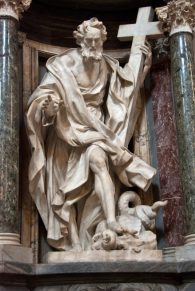Many years ago, Amy Welborn wrote a study guide for Pope Benedict XVI's collected General Audience talks on the Apostles and other early Church figures. The study guide is available online in pdf form - so if you have a church discussion group and would like to use it, or even just for yourself - there it is.
Today - May 3 - is the feast of Sts. Philip and St. James, included in that collection of General Audience talks. Here is a portion of Pope Benedict's talk on St. Philip:
The Fourth Gospel recounts that after being called by Jesus, Philip meets Nathanael and tells him: "We have found him of whom Moses in the law and also the prophets wrote, Jesus of Nazareth, the son of Joseph" (Jn 1: 45). Philip does not give way to Nathanael's somewhat sceptical answer ("Can anything good come out of Nazareth?") and firmly retorts: "Come and see!" (Jn 1: 46).In his dry but clear response, Philip displays the characteristics of a true witness: he is not satisfied with presenting the proclamation theoretically, but directly challenges the person addressing him by suggesting he have a personal experience of what he has been told.The same two verbs are used by Jesus when two disciples of John the Baptist approach him to ask him where he is staying. Jesus answers: "Come and see" (cf. Jn 1: 38-39).We can imagine that Philip is also addressing us with those two verbs that imply personal involvement. He is also saying to us what he said to Nathanael: "Come and see". The Apostle engages us to become closely acquainted with Jesus.In fact, friendship, true knowledge of the other person, needs closeness and indeed, to a certain extent, lives on it. Moreover, it should not be forgotten that according to what Mark writes, Jesus chose the Twelve primarily "to be with him" (Mk 3: 14); that is, to share in his life and learn directly from him not only the style of his behaviour, but above all who he really was.Indeed, only in this way, taking part in his life, could they get to know him and subsequently, proclaim him.Later, in Paul's Letter to the Ephesians, one would read that what is important is to "learn Christ" (4: 20): therefore, not only and not so much to listen to his teachings and words as rather to know him in person, that is, his humanity and his divinity, his mystery and his beauty. In fact, he is not only a Teacher but a Friend, indeed, a Brother.How will we be able to get to know him properly by being distant? Closeness, familiarity and habit make us discover the true identity of Jesus Christ. The Apostle Philip reminds us precisely of this. And thus he invites us to "come" and "see", that is, to enter into contact by listening, responding and communion of life with Jesus, day by day.
